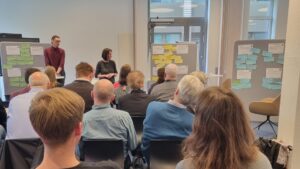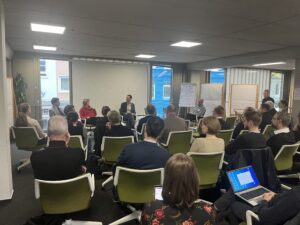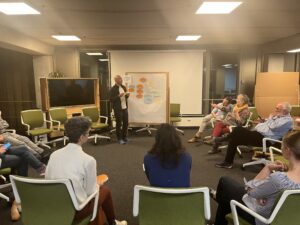How Hamburg Builds a Data Culture in Public Administration
In today’s rapidly digitizing world, public administration faces a complex data landscape. With diverse data sources, formats, and systems often lacking interoperability, key issues like data compatibility, data quality, data classification, and ethics become even more pressing. To navigate these challenges and promote agility, innovation, and citizen engagement, Hamburg is taking a proactive approach to foster a strong data culture within its institutions.

What is Data Culture?
Data culture isn’t just about using data—it’s a mindset that treats data as an asset and integrates it into daily work. This involves cultivating data literacy, which means everyone can understand, interpret, and effectively communicate data to make better decisions. It also includes the attitudes and values that shape how public institutions handle data, from guiding policy decisions to managing daily tasks and interacting with the public. For example, in a public administration office that allocates emergency resources, a strong data culture means decisions are based on reliable data, are communicated transparently, protect personal information, include all communities, and are carefully examined in context.
Building an Institutionalized Data Culture
Creating a strong data culture goes beyond just improving data literacy. It requires a few key elements:
- Systemic Awareness: Understand how data interacts within complex systems and enhances problem-solving.
- Collaboration: Share data across departments to make more informed decisions.
- TransparencyAccording to OGP’s Articles of Governance, transparency occurs when “government-held information (including on activities and decisions) is open, comprehensive, timely, freely available to the pub... More: Clearly communicate how data is used to build trust with citizens.
- Ethical Practices: Collect, store, and use data responsibly.
- Continuous Improvement: Data culture must evolve with changing technology and practices.

The “Data Dialogue” Initiative
In 2023, Hamburg launched the “Data Dialogue” initiative to simplify data topics for citizens, institutions, and officials.
Hamburg’s “Data Dialogue” initiative has been a success, with four events and over 120 participants demonstrating the power of open dialogue and collaboration in data-driven decision-making. The initiative has sparked increased interest in alternative approaches to data, leading to ongoing discussions in public administration and civil society about embracing new, innovative data practices. Moreover, it has fostered stronger connections among data experts across various sectors of Hamburg’s administration, leading to the exchange of valuable knowledge and experiences.
Exploring New Practices
In each “Data Dialogue,” Hamburg is trying out innovative methods and approaches to institutionalize data culture. For example:
- The Warm Data Lab is a method designed to help participants from various backgrounds understand data within complex systems, leading to a more holistic view of its societal role. During discussions at the Haus des Engagements participants explored the impact of digital data on educationAccountability within the public education system is key to improving outcomes and attainment, and accountability is nearly impossible without transparent policies and opportunities for participation ..., the environment, politics, and more.
- The Design JusticeTo address barriers that prevent citizens from having their justice needs met, OGP participating governments are working to expand transparency, accountability, and inclusion into all systems of justi... approach prioritizes equity and inclusionOGP participating governments are working to create governments that truly serve all people. Commitments in this area may address persons with disabilities, women and girls, lesbian, gay, bisexual, tr... More in developing data systems, influencing how those systems are designed and implemented. By considering diverse communities, it can promote fairness and reduce bias. For instance, a Design Justice-based Learning Management System (LMS) in public administration ensures accessibility for all by offering multilingual and culturally sensitive content, providing equitable and adaptive learning, and mitigating bias. This approach includes needs assessments, accessibility auditsInstitutional and legal frameworks are necessary for providing assurance of the integrity of financial information and of compliance with budgetary rules and procedure. Technical specifications: These..., a diverse design team, cultural sensitivity training, and strong data privacy.

These practices contribute to different facets of data culture: the Data Dialogue promotes collaboration and transparency, Warm Data Labs enhance systemic awareness, and Design Justice ensures ethical practices and inclusivity.
Hamburg’s experience underscores the critical role of data culture in public administration. It not only boosts operational efficiency and innovation but also builds trust and engagement with citizens. As we move forward, data culture will remain a cornerstone of effective governance.
Learn from Hamburg’s journey, embrace change, and join the effort to build a data-driven future for public administration.
Full article: Data culture and data communities for and in the public administration – Hamburg, 2024.
Comments (1)
Leave a Reply
Related Content
 Challenges and Solutions
Challenges and Solutions From Transparency to Engagement: Hamburg’s Path to Open Government
 Champions
Champions Faces of Open Government: Sarah Wesonga
Meet Sarah Wesonga, Program Officer for Transparency and Access to Information at ARTICLE 19 Eastern Africa.
 Champions
Champions Faces of Open Government: Philip Thigo
Philip Thigo has been the OGP point of contact in the Government of Kenya for many years, working with civil society partners to advance the open government agenda in the…


Helena Peltonen-Gassmann Reply
With Data Culture and Data Dialogs, #Hamburg is on the right track towards Open Government and has understood that the challenge is a cultural one. Happy to whitness and experience this development.